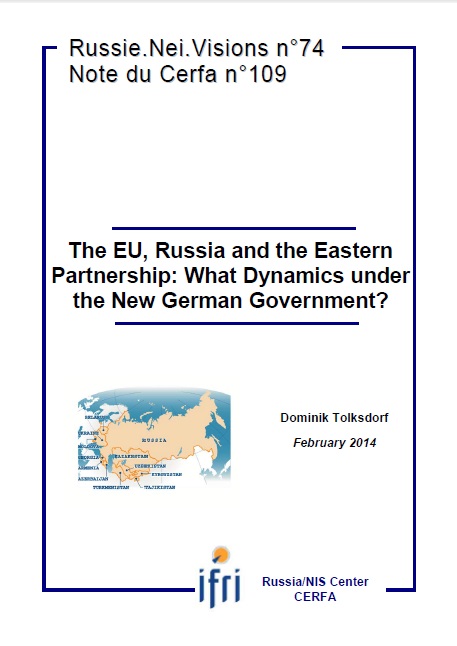The EU, Russia and the Eastern Partnership: What Dynamics under the New German Government?

The Eastern Partnership summit in Vilnius in November 2013 demonstrated that the European Union’s policy toward its eastern neighbors has developed into a highly contentious issue between the EU and Russia.
The summit was overshadowed by the decision of the Ukrainian government not to sign an Association Agreement with the EU and the following mass demonstrations in Kyiv. This paper analyses the EU’s relations with the EaP countries and illustrates that all of them are torn between intensified relations with the EU and joining the Russian dominated Customs Union. Although the EU is rather reluctant to start a power game with Russia in the “shared neighborhood”, the EaP has without doubt led to strained EU-Russia relations. As will be illustrated, it is difficult on the EU level to constitute a clearly unified position on Russia. Among the explanatory factors is Germany, which has in the past often not aligned its position on Russia with its EU partners. German-Russian political relations, however, underwent a change since 2012, as the Merkel government has become more critical about political developments in Russia. Although the new “grand coalition” with Frank-Walter Steinmeier as foreign minister will pursue a more conciliatory tone toward the Kremlin than in the past two years, the German government is nevertheless likely to more closely align its position on Russia with its EU partners, and will also not shy away from criticizing the Kremlin if the Russian government attempts to undermine the EaP.
Dominik Tolksdorf is Transatlantic Post-Doctoral Fellow for International Relations and Security (TAPIR) at the French Institute of International Relations (Ifri). He focuses in his research on the European Union’s external relations and particularly its pre-accession, neighborhood and crisis management policies.
This publication is available in:
French: UE, Russie et Partenariat oriental : quelles dynamiques sous le nouveau gouvernement allemand ? (pdf)
Russian: ЕС, Россия и Восточное партнёрство: новая динамика отношений при новом правительстве в Германии? (pdf)

Available in:
Regions and themes
ISBN / ISSN
Share
Download the full analysis
This page contains only a summary of our work. If you would like to have access to all the information from our research on the subject, you can download the full version in PDF format.
The EU, Russia and the Eastern Partnership: What Dynamics under the New German Government?
Related centers and programs
Discover our other research centers and programsFind out more
Discover all our analysesThe Caspian Sea as an Emerging Energy Hub : Potentials and Limitations
This report analyzes the prospects of the Caspian Sea region — and its key actors except for Russia and Iran — becoming an important energy hub serving the needs of the European Union (EU).
The European Union's Strategic Test in Georgia
The political crisis brewing in Georgia is of an existential nature for the country. What is at stake is Georgia's future as a democratic and sovereign European nation (EU).
Commanders of Putin's Long War: Purged, Reshuffled and Disgruntled
The trend of reshuffling the Russian top military command in the course of a fast-evolving and far from successful war has progressed unevenly both across the Armed Forces’ structures and in time. The rationale for and timing of the abrupt cadre decisions made by Commander-in-Chief Putin often defy logical explanation, and the rare official clarifications are no more informative than the usual information blackout.
Russian Military Manpower After Two and a Half Years of War in Ukraine
In addition to a military victory in Ukraine, the Russian leadership is planning to build up sizable troop formations for a possible conflict with NATO in the Baltic region and the Kola Peninsula. In particular, current plans aim for the military manpower to grow by about 350,000, reaching a total of 1.5 million soldiers and commanders. In the context of the current conflict in Ukraine, this cannot be accomplished without a new wave of mass mobilization.








